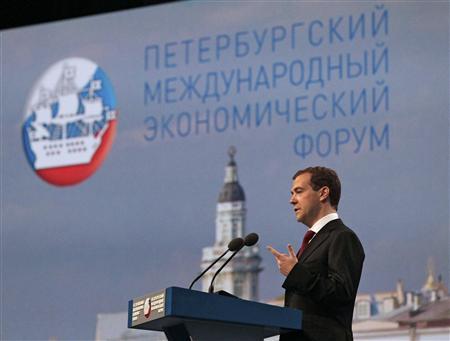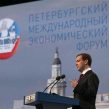
Medvedev Speaks Against Putinism and Fails to Disprove Khodorkovsky
Publication: Eurasia Daily Monitor Volume: 8 Issue: 118
By:

The annual economic forum in St. Petersburg is not known for quality debates and builds its reputation around a major political speech traditionally delivered by the leader or a candidate with the ambition to set Russia’s course for years to come. President Dmitry Medvedev rose to the occasion last week rejecting the proposition for a steady moderate growth as a mistake, suggesting that the “much touted stability” was a recipe for stagnation and asserting that his modernization program required a thorough overhaul of “not just outdated parts of our economy, but all of our public institutions.” His point that corruption is a direct consequence of excessive state involvement in the economy and over-centralization of power is a precise hit on the fundamental flaw of the political system commonly described as Putinism, and his scornful rejection of the “manual management” sounds like a direct criticism of the style of leadership characteristic for Prime Minister Vladimir Putin (Kommersant, www.gazeta.ru, June 18). Medvedev insisted that “my choice is different,” but could not dispel doubts that this alternative choice is meaningful.
These doubts were spelled out by Mikhail Khodorkovsky, Russia’s most famous political prisoner, in interviews with Western media last week given before his sudden transfer from Moscow to a prison in Karelia (www.newsru.com, June 16; Ekho Moskvy, June 15). He argued that differences between Putin and Medvedev were far from wide because they were members of the same team aiming at stabilizing the corrupt bureaucratic system of power and that Medvedev – even if allowed to stay for the second presidential term – might not be able to implement his ambitious ideas. As if responding to Khodorkovsky, Medvedev tried to assert that his “project will go ahead no matter who holds office in this country over the coming years,” but his word rings rather hollow because the support base for the modernization breakthrough remains rather thin. The self-serving bureaucracy is entirely unimpressed by his claim that its dominance “jeopardizes the country’s future,” and the society may become angry at the blossoming corruption but still prefers greater state control and paternalistic support (Vedomosti, June 17).
These anti-modernization attitudes are underpinned by expectations of everlasting oil revenues, and the International Energy Agency has indeed confirmed their soundness in the report presented at the St. Petersburg forum, which predicts a further rise of oil prices in the next five years perhaps as high as $200 per barrel (www.gazeta.ru, June 16). Such forecasts make Medvedev’s preaching that “counting on prices staying favorable is not consistent with our long-term goals” devoid of practical sense because every entrepreneur as well as every pensioner knows that real money in Russia could only be made in and obtained from the oil and gas sector. The restored confidence in high demand for hydrocarbons has made Moscow unyielding in the negotiations with China on prices for the long-promised export of natural gas (Moskovskiy Novosti, June 16). President Hu Jintao has rarely lost so much face as during this St. Petersburg forum where he had agreed to come for the signing of the long-term gas contract, which failed to materialize (Kommersant, July 17).
The contract that was signed with all the due ceremony as the high mark of the forum was the one on the purchase from France of two Mistral-class amphibious assault ships for 1.2 billion Euros ($1.7 billion) (RIA Novosti, June 17). In the early bargaining stage two years ago, the unprecedented deal was justified as proof of new relations between Russia and NATO, which have by now peaked and settled on the familiar pattern of small steps in building the non-existent trust and bitter quarrels about unrealistic plans for deploying a missile defense system. The deal then becomes a symbol of NATO’s indifference to Russia’s authoritarian tendencies and the readiness of major European states to put the parochial interests of securing jobs in their struggling industry first. Khodorkovsky warns about hard consequences of such short-sighted Realpolitik, which forgets about Euro-Atlantic democratic values and aims at engaging Russia as it is on the assumption that the West cannot influence its domestic development (RIA Novosti, June 15).
Such a “pragmatic” policy accepts that Medvedev’s “modernization” would be reduced to a few isolated projects cultivated in walled high-tech centers like Skolkovo, while Putin’s “stability” would form the renewed social contract, by which the corrupt elites secure sufficient support from the electorate by distributing budgetary giveaways. The problem with this perspective is the diminishing validity of this contract in the situation of low growth, so many Russian economists warn about the inevitable decline of real income and corresponding rise of social discontent (Ezhednevny Zhurnal, June 16; www.gazeta.ru, June 15). This trend develops against the background of a steady recovery of the global economy, but it will take only a moderate volatility, not to mention the “perfect storm” that some experts see coming, to push stagnating Russia into a fast implosion (Nezavisimaya Gazeta, June 15). Khodorkovsky is worried that the time for peaceful liberalization is running out and that the anger against corrupt quasi-democratic rulers could suddenly turn violent much the same way as it has during the “Arab spring” (www.grani.ru, June 15).
Putin is unperturbed by such alarmism and harbors no doubt that his “executive vertical” has proven its resilience by weathering the storm of painful economic contraction and would serve its purpose of centralized political control over major financial flows for years to come. His method of choice in addressing the risks of marginal hue and cry is heavy-handed management of elections, so he goes forward with building a coalition for “stability” as if Medvedev does not exist. Putin’s junior partner has indeed become an odd man out in the disciplined ranks of top bureaucracy and he has accepted his political failure as a natural good loser. The political and business elites are not prepared to give him a chance for acting on his “choice,” but his words about “the models that would only lead our country backwards” are not lost. The confidence in Putinism is eroding from top-down, and the overwhelming vote for it would condemn this excessively corrupt system to disintegration caused by desertion and disrespect.




